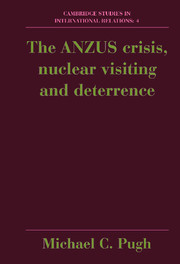Book contents
- Frontmatter
- Contents
- List of tables
- Preface
- List of abbreviations
- 1 INTRODUCTION: THE REVOLT OF AN UNDERLING
- 2 THE ANZUS TREATY AND STRATEGIC DEVELOPMENTS
- 3 DEFENCE CO-OPERATION AND NUCLEAR CONNECTIONS
- 4 WARSHIP ACCESS AND THE ANZAC LIABILITY SUSPENSIONS
- 5 NUCLEAR HAZARDS AND ENVIRONMENTAL SAFETY: ISSUES OF THE 1980S
- 6 ANTI-NUCLEAR POLITICS
- 7 FROM NEGOTIATION TO LEGISLATION
- 8 REGIONAL SECURITY AND THE FUTURE OF ANZUS
- 9 THE ANZUS CRISIS, NUCLEAR VISITING AND THE WESTERN ALLIANCE
- APPENDICES
- Notes
- Bibliography
- Index
- Frontmatter
- Contents
- List of tables
- Preface
- List of abbreviations
- 1 INTRODUCTION: THE REVOLT OF AN UNDERLING
- 2 THE ANZUS TREATY AND STRATEGIC DEVELOPMENTS
- 3 DEFENCE CO-OPERATION AND NUCLEAR CONNECTIONS
- 4 WARSHIP ACCESS AND THE ANZAC LIABILITY SUSPENSIONS
- 5 NUCLEAR HAZARDS AND ENVIRONMENTAL SAFETY: ISSUES OF THE 1980S
- 6 ANTI-NUCLEAR POLITICS
- 7 FROM NEGOTIATION TO LEGISLATION
- 8 REGIONAL SECURITY AND THE FUTURE OF ANZUS
- 9 THE ANZUS CRISIS, NUCLEAR VISITING AND THE WESTERN ALLIANCE
- APPENDICES
- Notes
- Bibliography
- Index
Summary
In the mid-1980s, the spectacle of New Zealand withdrawing the customary warship visiting privileges of its powerful ally, the United States, and then absorbing reprisals, commanded world-wide attention. New Zealand is a small and vulnerable country in the international system, and its ban on nuclear ship visits was portrayed by sympathizers as a clash between David and Goliath. By contrast, hostile observers depicted the ban as preposterous grandstanding by a socialist government under the sway of misguided or even malevolent pacifists determined that their country should opt out of alliance responsibilities. Neither picture is accurate.
The alliance conflict and the media caricatures captured my interest and research began with the aim of writing a balanced interpretation of the ANZUS crisis in the context of changing security concerns in the South-West Pacific. In addition, it became evident that the subject could not be divorced from general problems associated with the visits of nuclear-powered and nuclear-armed platforms. In Washington, heightened sensitivity to anti-nuclearism led the Reagan Administration to demonstrate that a ‘public good’ would not be supplied to allies who restricted its distribution. Nuclear visiting, like basing, is one of the tangible means by which the assumed ‘good’ of nuclear deterrence is maintained and distributed. In April 1988 as this book was nearing completion it became abundantly clear from a political crisis in Denmark over the access of nuclear-capable warships that the problem was a general and continuing one.
- Type
- Chapter
- Information
- The ANZUS Crisis, Nuclear Visiting and Deterrence , pp. xi - xiiiPublisher: Cambridge University PressPrint publication year: 1989

